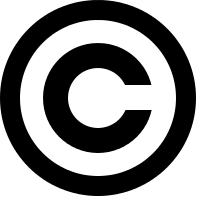 |
| Masur. "Copyright". 21 September 2012 via Wikimedia Commons Public Domain |
I will post my project #2 draft at the end of this blog post and there are a few things that can help you as a peer reviewer for my rhetorical analysis. The controversy I am talking about in my project is whether or not the process of de-extinction is ethical. I will include body paragraphs that analyze the different cultural values and ideology that is embedded in text and how these views are shared by the audience. I would encourage you as a peer reviewer to point any out any mistakes that are in my analysis. Mistakes include any grammatical errors, stylistic errors, or pointing out if there are any viewpoints of mine that might have bias towards favoring one position over another.
My Rhetorical Analysis
Reflection:
After reading Jason Wittler's and Mark Mellott's drafts I have learned a few things about the four Clarity topics that I have chosen to view in greater detail. As for learning about "Prefer active verbs", I found that the main passive verb that I used had the word "are" in front of it. I have learned that it is practically inevitable to not have a passive verb in our paper. I realize that is recommended to use active verbs and stay away from passive verbs. Although I have passive verbs in my paper, along with the papers I have read from my peers, we do not have them in excess in our papers. For example from Mark Mellott's rhetorical analysis draft, he had an example of a passive verb, "Another important piece of information when considering the position and reasoning presented in this article is the context in which this article was written." From Jason Wittler's rhetorical analysis, he had an example of a passive verb, "The audience may or may not be aware of the inner workings depending on their closeness to the sport, but almost everyone was caught up in the speculation of whether or not a 37 year drought would come to an end."
For the topic of emphasizing key ideas, I believe we all did a good job of making sure that we did that in our papers. Giving readers the ability to view the key points in our papers is crucial as it is, in my opinion, almost as important as stating the thesis. Here is an example from Mark Mellott's draft, "He does include brief coverage of the opposition to WIPP and fails to critique the arguments of this half of the controversy, but he does refute their claims in a non-descript way." Also, here is an example from Jason Wittler's draft, "She isn’t trying to create the next wave of anti-horse racing in America but how she weaves the patterns and word choices blends into a fabric that caters to everyone."
As for reviewing the "Provide some variety" section, I also found that we all utilized this approach in our papers. Variety is key, is it strays from the commonality of writing a paper that sticks to the same conventions. Here is an example from Mark Mellott's draft, "A scientist will overlook lack of credibility and emotional appeal if the argument has a logical format." This is an example of a complex sentence. Here is an example from Jason Wittler's draft, "With almost no validation for expertise in the area of horse racing, Pia Catton deftly navigates the issue by choosing some of the most renowned figures in the industry." This is also an example of a complex sentence.
The last topic in the Clarity section that I reviewed was "Tighten wordy sentences". I would like to fix the few occurrences that I have in my paper that have a sentence that is too wordy. Again, I believe sometimes, having wordy sentences in a few cases, is inevitable. My peers did a good job of tightening their wordy sentences by having shorter and more concise sentences. Here is an example from Mark Mellott's draft, "A scientist is not easily convinced by an endearing tale or emotional appeal." This sentence does a good job of being concise at by avoiding the look of being wordy. Here is an example from Jason Wittler's draft, "The chase for the Triple Crown is the number one draw that horse racing has in the United States." This sentence does a good job of explaining the importance of a horse race without going too in-depth into what it is about.
No comments:
Post a Comment